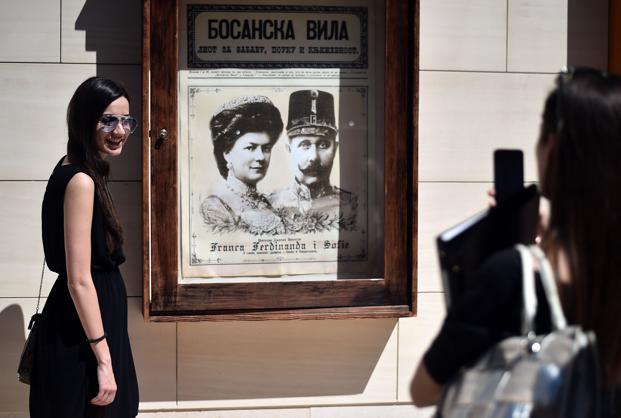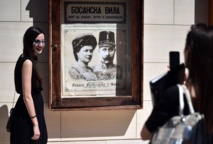Many of those competing powers commemorated the centenary on the sidelines of an EU summit on Thursday with a low-key ceremony at Belgium's Ypres, where German forces used mustard gas for the first time in 1915.
But in the Balkans, the legacy of the Great War continues to stir up ethnic divisions between Serbs, Croats and Muslims, preventing heads of state from coming together to mark the event at the site of the assassination in Bosnia's capital.
"It would have been impossible to bring everyone together on June 28 in Sarajevo," said Bosnian Serb historian and diplomat Slobodan Soja.
- Hero or villain -
There are wildly differing interpretations of 20th century history in the region where the scars of sectarian wars in the 1990s are still fresh.
The assassin, Gavrilo Princip, is among the most divisive figures in that history -- either a fervent Serb nationalist who sought to liberate Slavs from the Austro-Hungarian occupier, or a terrorist who unleashed horrific bloodshed on the world, depending on who you ask.
Serbian and Bosnian Serb leaders refused to take part in the main commemorations in Sarajevo on Saturday that were set to feature a performance by the Vienna Philharmonic in the late afternoon -- a highly symbolic envoy from the capital of a once-loathed empire.
The Serbs instead unveiled a two-metre-high bronze statue of Princip in eastern Sarajevo on Friday and held their own ceremonies on Saturday in eastern Bosnia.
Top leaders, including Serbian Prime Minister Aleksandar Vucic and Bosnian Serb president Milorad Dodik joined the ceremony in the eastern town of Visegrad.
"The shot by Gavrilo Princip was not a shot against Europe... it was a shot of freedom aimed at the final liberation and emancipation of the Serbian nation," Dodik told several hundred people who gathered in Andricgrad, a neo-medieval city Serbian film director Emir Kusturica has built in the heart of Visegrad.
It was named after Ivo Andric, Nobel Literature Prize winner whose novel "The Bridge on the Drina River" celebrated Visegrad.
The city, with stone buildings of different styles reflecting the influence of various historic eras in the Balkans, should serve as a scenography for a future movie of Kusturica, twice Palme d'Or winner.
In a main street named after Princip's revolutionary movement "Young Bosnia", Serb leaders unveiled a huge mosaic - with Ferdinand's castle in the background - with an inscription which read "Our souls will hang around your castle and haunt you".
"We are here to pay homage to Gavrilo Princip, a key historic figure of the last century," said 58-year-old Ljubisa Simonovic, who had travelled from Serbia for the ceremony along with hundreds of others.
"The divisions are regrettable but so are attempts to change the facts, particularly if they are motivated by recent history."
Until the Bosnia war in the 1990s, Princip was Sarajevo's favourite son.
Two years after he died in prison in 1920 his bones were dug up and brought to be buried in the city, where a bridge was named after him and plaques put up in his honour.
During the 1990s conflict, he was worshipped as an icon of Serb nationalism by Bosnian Serb forces as they besieged Sarajevo in one of the war's most brutal episodes.
"For the army bombing Sarajevo, Gavrilo Princip was a cult figure," said Bosnian Muslim historian Husnija Kamberovic.
That ensured Princip was even more loathed by Muslim and Croat civilians trapped in the city, who wasted no time in tearing down his plaques and renaming his bridge after the war ended.
Princip's brazen attack 100 years ago dragged almost half the world's population into a cycle of violence of unprecedented scale and intensity.
What became known as the Great War lasted more than 52 months and left some 10 million dead and 20 million injured and maimed on its battlefields. Millions more perished under occupation through disease, hunger or deportation.
Four of the world's most powerful empires -- Russian, German, Austro-Hungarian and Ottoman -- collapsed in the aftermath. The ruin of Europe cleared the way for the rise of a new superpower, the United States.
World War I fanned the emergence of many of the ideologies that fashioned the 20th century and its conflicts, including anti-colonialism, Communism, Fascism and Nazism.
----------------------------------------------------------------------------------------------------
But in the Balkans, the legacy of the Great War continues to stir up ethnic divisions between Serbs, Croats and Muslims, preventing heads of state from coming together to mark the event at the site of the assassination in Bosnia's capital.
"It would have been impossible to bring everyone together on June 28 in Sarajevo," said Bosnian Serb historian and diplomat Slobodan Soja.
- Hero or villain -
There are wildly differing interpretations of 20th century history in the region where the scars of sectarian wars in the 1990s are still fresh.
The assassin, Gavrilo Princip, is among the most divisive figures in that history -- either a fervent Serb nationalist who sought to liberate Slavs from the Austro-Hungarian occupier, or a terrorist who unleashed horrific bloodshed on the world, depending on who you ask.
Serbian and Bosnian Serb leaders refused to take part in the main commemorations in Sarajevo on Saturday that were set to feature a performance by the Vienna Philharmonic in the late afternoon -- a highly symbolic envoy from the capital of a once-loathed empire.
The Serbs instead unveiled a two-metre-high bronze statue of Princip in eastern Sarajevo on Friday and held their own ceremonies on Saturday in eastern Bosnia.
Top leaders, including Serbian Prime Minister Aleksandar Vucic and Bosnian Serb president Milorad Dodik joined the ceremony in the eastern town of Visegrad.
"The shot by Gavrilo Princip was not a shot against Europe... it was a shot of freedom aimed at the final liberation and emancipation of the Serbian nation," Dodik told several hundred people who gathered in Andricgrad, a neo-medieval city Serbian film director Emir Kusturica has built in the heart of Visegrad.
It was named after Ivo Andric, Nobel Literature Prize winner whose novel "The Bridge on the Drina River" celebrated Visegrad.
The city, with stone buildings of different styles reflecting the influence of various historic eras in the Balkans, should serve as a scenography for a future movie of Kusturica, twice Palme d'Or winner.
In a main street named after Princip's revolutionary movement "Young Bosnia", Serb leaders unveiled a huge mosaic - with Ferdinand's castle in the background - with an inscription which read "Our souls will hang around your castle and haunt you".
"We are here to pay homage to Gavrilo Princip, a key historic figure of the last century," said 58-year-old Ljubisa Simonovic, who had travelled from Serbia for the ceremony along with hundreds of others.
"The divisions are regrettable but so are attempts to change the facts, particularly if they are motivated by recent history."
Until the Bosnia war in the 1990s, Princip was Sarajevo's favourite son.
Two years after he died in prison in 1920 his bones were dug up and brought to be buried in the city, where a bridge was named after him and plaques put up in his honour.
During the 1990s conflict, he was worshipped as an icon of Serb nationalism by Bosnian Serb forces as they besieged Sarajevo in one of the war's most brutal episodes.
"For the army bombing Sarajevo, Gavrilo Princip was a cult figure," said Bosnian Muslim historian Husnija Kamberovic.
That ensured Princip was even more loathed by Muslim and Croat civilians trapped in the city, who wasted no time in tearing down his plaques and renaming his bridge after the war ended.
Princip's brazen attack 100 years ago dragged almost half the world's population into a cycle of violence of unprecedented scale and intensity.
What became known as the Great War lasted more than 52 months and left some 10 million dead and 20 million injured and maimed on its battlefields. Millions more perished under occupation through disease, hunger or deportation.
Four of the world's most powerful empires -- Russian, German, Austro-Hungarian and Ottoman -- collapsed in the aftermath. The ruin of Europe cleared the way for the rise of a new superpower, the United States.
World War I fanned the emergence of many of the ideologies that fashioned the 20th century and its conflicts, including anti-colonialism, Communism, Fascism and Nazism.
----------------------------------------------------------------------------------------------------









 Home
Home Politics
Politics











